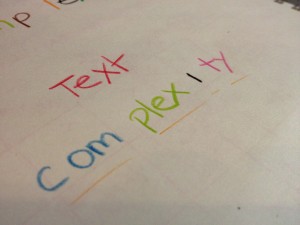How do I know this word?

2.9.12Today's reading session made me think a lot about the context that students bring with them to a text. Even the first week, I was amazed by the knowledge of words that Sienna had, despite her struggle to manage text at times.She obviously had absorbed so much, perhaps through conversation, through music and movies and even probably reading. But how does one get into a text? How does one break down the barriers of challenging text and persevere?Here are today's experiences.SiennaI picked up Sienna first and gave her the option to select a book like I had done the first week. She selected a book about deserts from the non-fiction bucket. I tried using some of the strategies we'd been taught in the training "What does the cover make you think? What kind of plant is that?" She talked confidently about the cactus on the cover but as soon as we opened the book and started to read, I could see her face fall. She looked up at me and asked if she could get another book and I coalesced. After all, how could it be worthwhile if she wasn't passionate about the text? She came back a book in the Thomas the Train series.She asked if we could share reading responsibilities like we did last week. She started, and as we read, I could see her struggle over words. Each time she encountered a challenging word she got more discouraged. She wasn't a fan of sounding the words out. She slowly lost interest in the book and got up to find a new one, bringing back another Thomas the Train book. This one had just one sentence per page with little cut outs she could open and close. We ended up reading this book instead.As I walked her back to class, I asked her about why she didn't seem to like reading. She responded that she got easily frustrated because it was challenging and therefore she didn't want to keep doing it. I was really appreciative of her self awareness and honesty.CharlotteWhen I went to pick up my second student, let's call her Charlotte, I saw a small little girl look up at me with anticipation. She quietly walked toward me and I introduced myself and started a casual conversation. Personality wise, she was very different from Sienna, more serious, more shy. While we walked to the classroom she mentioned she loved music. So when we got to the book cart, I pointed out a book about Duke Ellington (not having any knowledge of this book myself) and asked her if she wanted to read it. She agreed.As she began to read to me I was surprised by the complexity of some of the words. In the first few pages, the author uses the phrase "umpy-dump", to describe the sound Duke Ellington thought the piano used to make before he cultivated a love for the instrument. The author also uses colloquialisms like "' playin' " and "singin'" and similar phrasing. I found myself thinking... How does a third grader, whose focus and emphasis in school is likely on spelling /speaking correctly, reconcile these words/phrases? Then there were words that she could pronounce but hard to explain like the phrase "self-rousing romp" and the word "plunk." For these, I used analogies, expressions, even whole body action, to "define" the words. I even used my iPhone to pull up a clip, to illustrate what ragtime music sounded like, which prompted some laughter and wonder. _(Yes!)_This got me thinking, should I have stopped and said "hey this book isn't for you?" I did my best to explain the words in simpler language so she could relate to the sentiments being expressed, but I still wasn't sure how this book was okay for a third grade student. At the end of a sentence or two, I would talk to her about what she understood, asking her probing questions, without (at least I hope) being too forceful.What was different about Charlotte was that she seemed open to my approach of reading, questioning, sounding out, repeating, discussing and so on. Before I knew it, I was walking her back to class.ReflectionsI left today, inspired. My time with Charlotte encouraged me that there was a way to find wonder in the story, even for kids who need more support with the reading of text. It was also heartening to hear Sienna share her frustration with reading, because it gave me a starting point.But, again, I'm left with questions, some philosophical, some practical:
- What does a teacher do with a student who clearly loves narrative but struggles with interpreting written text?
- When text seems to be more complex than students are ready for, do we still persist?
- Can breaking down and discussing text, demystify the text?
- Is there a way to determine if students' are truly understanding text, when there's so much emphasis on decoding words and explaining the broader meanings of sentences/phrases? How?
- When does the teaching of reading stop ? (When does it become about teaching about what's being read?) What happens to the students who don't get past the first part?